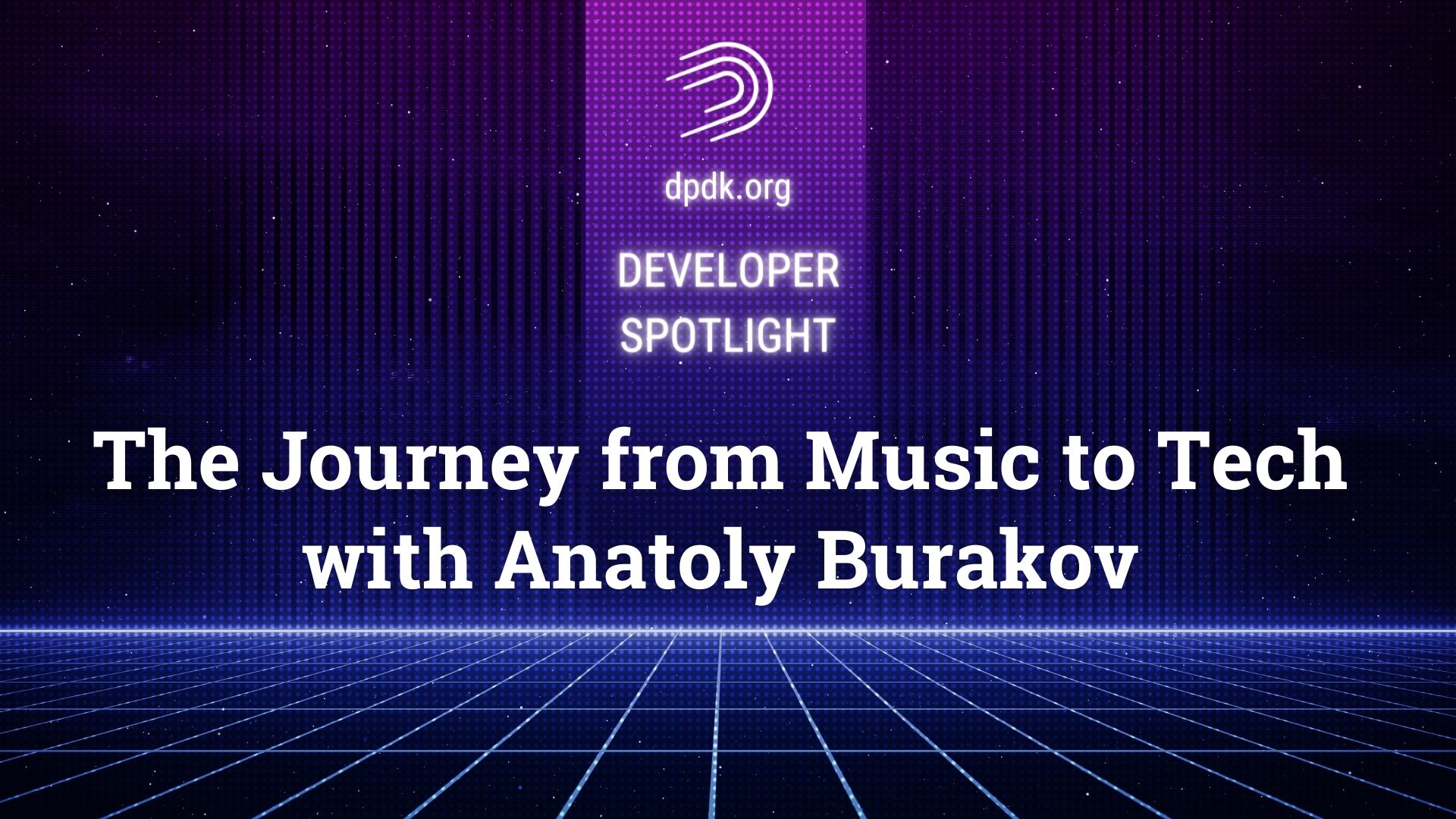
In this edition of our developer spotlight, we had the privilege of speaking with Anatoly Burakov, a foundational and key contributor to the DPDK (Data Plane Development Kit). This spotlight explores Anatoly’s unique journey into software development, his role at Intel, and his significant contributions to the DPDK community.
From Music to Technology: A Unique Path
Anatoly Burakov’s journey to software development was anything but conventional. Initially aiming for a career as a pianist, Anatoly found a new passion in coding, turning a hobby into a professional career. His first foray into programming was not in a conventional classroom but rather through a PlayStation 2, showcasing early signs of his innovative and problem-solving mindset. This unconventional start was a prelude to a fascinating career in technology.
His transition from music to technology marked a pivotal shift in his life. He pursued computer networking at a university in the UK, setting the stage for his eventual role at Intel. This transition underscores a key theme in Anatoly’s story: the ability to adapt and find new passions.
Intel and the World of DPDK
Joining Intel marked a significant chapter in Anatoly’s professional life. Starting out, he wasn’t a seasoned software developer but possessed enough coding prowess to navigate through various challenges. This period was crucial in honing his skills and understanding the nuances of professional software development.
At Intel, Anatoly began working with the DPDK, a toolkit that was relatively obscure at the time. His initial tasks involved unit testing and bug fixing, which he found particularly fulfilling. He describes the joy that comes from identifying and resolving issues, a testament to his deep understanding of systems and problem-solving abilities.
Community Engagement and Collaboration
Anatoly’s engagement with the DPDK community gained momentum with the release of version 1.7. This was a notable milestone, as it marked the first time Intel integrated its changes into the public tree created by Thomas Monjalon. This integration was more than just a technical accomplishment; it symbolized the beginning of a more collaborative and open era for DPDK.
Anatoly’s role in this process was significant. He was the first from Intel to engage deeply with the DPDK community, working on adding VFIO support. His contributions were substantial, at one point holding the record for the most patches submitted to the DPDK community. This achievement highlights not only his technical skills but also his commitment to the community and open-source development.
The Intersection of Music and Coding
Anatoly’s coding philosophy is influenced by his musical background. He views coding not merely as a technical task, but as a form of expression, similar to a narrative that elucidates a solution to a problem. His extensive use of comments, often laced with humor, marks a distinctive aspect of his style. These comments offer clear explanations and maintain a logical flow, making his contributions functional, educational, and entertaining.
Hyperscan and the Role of a Generalist
Anatoly’s career took an exciting turn with Intel’s acquisition of Sensory Networks, where he became one of the first engineers to work on Hyperscan, a high-performance regular expression matching engine. This project underscored his role as a generalist – someone who excels in adapting to a multitude of tasks and overcoming diverse challenges, as opposed to being domain specific.
Engaging with the DPDK Community
Engaging with the DPDK community was a significant step in Anatoly’s career. He played a key role in integrating Intel’s work with the public DPDK tree, a process that started around the release of DPDK 1.7. This integration was pivotal for DPDK, marking the beginning of a more collaborative and open environment. Anatoly’s approach to community engagement—submitting code, taking feedback constructively, and contributing solutions—mirrors the ethos of open-source communities.
Advice for Aspiring DPDK Contributors
For new developers aspiring to contribute to DPDK, Anatoly advises starting by addressing personal pain points encountered while using DPDK. This approach not only makes the initial foray into contributing more relatable but also ensures that the contributions are genuinely beneficial to end-users.
His emphasis on solving real problems reflects a practical mindset that is crucial in open-source development. For instance, if a prospective contributor finds DPDK difficult to set up or confusing to use, one way to address that would be to improve documentation.
In the past, there were many requirements on how to specify command line arguments. Although DPDK has moved away from that, there are still some command line arguments that could use better documentation or perhaps a different syntax.
Whatever needs fixing, is probably a good starting point. Fixing someone else’s problems can be fun, but for a new developer, the big driver in programming and learning how to program in the first place was trying to solve something you didn’t want to do manually or to automate something.
Looking ahead
While Anatoly’s capabilities as a generalist enable him to work effectively in both software and hardware domains, his personal inclination leans more towards software. A significant portion of his time and efforts are spent deep in the bowels of DPDK’s OS abstraction layers.
Life Beyond Coding
Outside of his professional life, Anatoly enjoys the simple pleasures of life, like relaxing on the beach or watching Netflix. His move from Ireland to Mallorca has been a significant change, offering him a new environment to explore and enjoy.
His hobbies, including audio mixing, and playing guitar demonstrate a continued passion for music, albeit in a different form than his initial pursuit of being a pianist.
A Tale of Continuous Learning
Anatoly’s story is a testament to continuous learning and adaptation. From a pianist to a software developer, his journey exemplifies the unexpected paths our careers can take, leading us to thrive in new and exciting and often unexpected domains. His involvement in DPDK transcends mere occupation, highlighting the transformative power of open-source communities in fostering collaboration and development.


